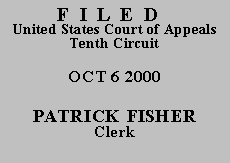

| UNITED STATES OF AMERICA, |
|
| v. | |
| ALDWYN GEORGE STEWART, |
Aldwyn Stewart, proceeding pro se, appeals the district court's denial of his application for a certificate of appealability pursuant to 28 U.S.C. § 2255. Mr. Stewart, a citizen of Jamaica, pleaded guilty to returning to the United States after deportation following conviction of an aggravated felony. He was sentenced on the re-entry charge to 57 months' imprisonment and three years supervised release. Mr. Stewart's judgment was filed on January 4, 1999 and was entered on the docket sheet the following day.
In his § 2255 motion before the district court, filed on January 5, 1999, Mr. Stewart claimed ineffective assistance of counsel based upon his counsel's failing to file a notice of appeal following his conviction on the re-entry charge. The district court determined that the § 2255 motion was time-barred by the statute of limitations established by 28 U.S.C. § 2244. The district court further stated, that "even if [Mr. Stewart's] motion had been timely filed, the files and records nevertheless conclusively show that he is entitled to no relief." Rec. vol. I, doc 20 (Order dated Feb. 8, 2000) ¶ 3.
In its analysis of the merits of Mr. Stewart's petition, the court's analysis suggests that because Mr. Stewart signed a waiver of his right to appeal, he was foreclosed from basing a claim of ineffective assistance on his counsel's failure to file a notice of appeal. The district court subsequently dismissed Mr. Stewart's application for a certificate of appealability. A renewed application is before us now.
Because the record suggests that there may have been some confusion as to the exact date on which the judgment on Mr. Stewart's conviction became final, see 28 U.S.C. § 2255, we are reluctant to dispose of Mr. Stewart's petition because it was untimely. We may affirm for any reason on appeal, and turn to the merits of Mr. Stewart's application and the pleadings, which we construe liberally. See Haines v. Kerner, 404 U.S. 519, 520 (1972).
Mr. Stewart contends that after he stated his reluctance to sign the waiver, his counsel suggested to him, through a fellow inmate, that Mr. Stewart would receive a greater sentence if he chose to appeal his sentence. Based on this information and alleged pressure from counsel, Mr. Stewart signed the waiver of his right to appeal. He now contends he was unaware of the preclusive effect of his assent.
To demonstrate ineffectiveness of counsel, Mr . Stewart must show that his counsel's performance fell below an objective standard of reasonableness, and that counsel's deficient performance was prejudicial. See Strickland v. Washington, 466 U.S. 668, 687, 690 (1984). Ineffective assistance of counsel claims involve mixed questions of law and fact which we review de novo. See United States v. Prows, 118 F.3d 686, 691 (10th Cir.1997).
In this case, in order to establish prejudice under Strickland, Mr. Stewart would be required to establish that, if his counsel had not induced him to sign the waiver, there is a reasonable probability that he would have prevailed on appeal. The record evinces no such reasonable probability. We agree with the district court that Mr. Stewart has "failed to make a substantial showing of the denial of a constitutional right," 28 U.S.C. § 2253(c)(2), required to obtain a certificate of appealability.
Accordingly, we DENY Mr. Stewart's request for a certificate of appealability and DISMISS the appeal.
Robert H. Henry
Circuit Judge
*. This order and judgment is not binding precedent, except under the doctrines of law of the case, res judicata, and collateral estoppel. The court generally disfavors the citation of orders and judgments; nevertheless, an order and judgment may be cited under the terms and conditions of 10th Cir. R. 36.3.
**. After examining the briefs and appellate record, this panel has determined unanimously that oral argument would not materially assist the determination of this appeal. See Fed. R. App. P. 34(a)(2); 10th Cir. R. 34.1(G). The case is, therefore, ordered submitted without oral argument.